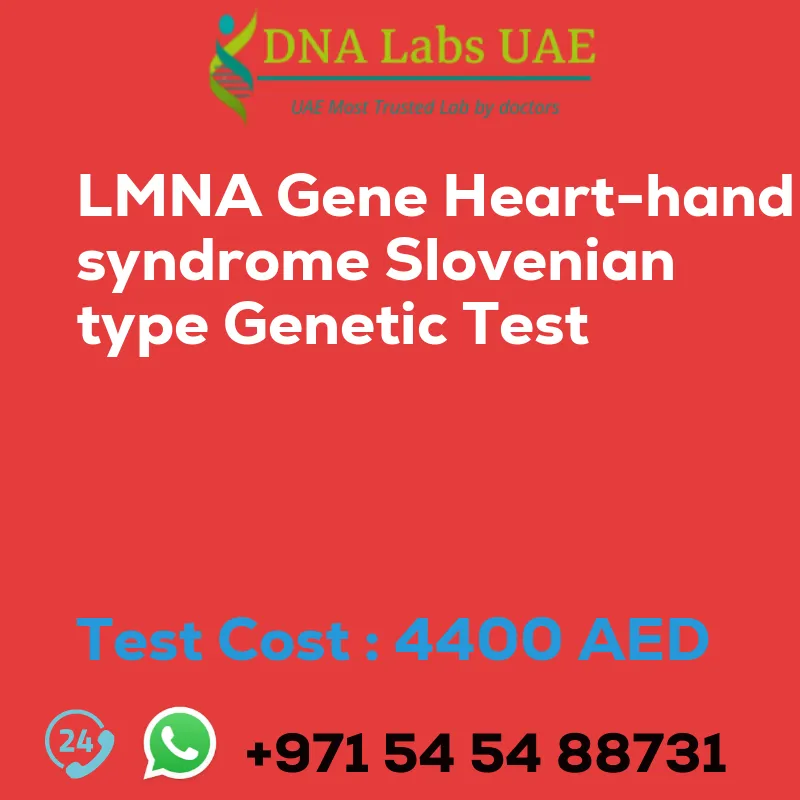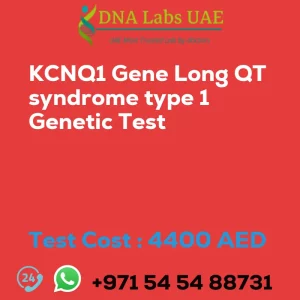LMNA Gene Heart-hand syndrome Slovenian type Genetic Test
Welcome to DNA Labs UAE, where we offer the LMNA Gene Heart-hand syndrome Slovenian type Genetic Test. This test can help diagnose individuals with heart-hand syndrome, Slovenian type, a rare genetic disorder characterized by abnormalities in both the heart and the hands.
Test Components
The LMNA Gene Heart-hand syndrome Slovenian type Genetic Test includes:
- Sample Condition: Blood or Extracted DNA or One drop Blood on FTA Card
- Report Delivery: 3 to 4 Weeks
- Method: NGS Technology
- Test Type: Cardiovascular Pneumology Disorders
- Doctor: Cardiologist
- Test Department: Genetics
Pre Test Information
Before undergoing the LMNA Gene Heart-hand syndrome Slovenian type Genetic Test, it is important to provide the clinical history of the patient. Additionally, a genetic counseling session will be conducted to draw a pedigree chart of family members affected by LMNA Gene Heart-hand syndrome, Slovenian type NGS Genetic DNA Test.
Test Details
The LMNA gene is responsible for encoding the lamin A/C protein, which plays a crucial role in maintaining the structural integrity of the cell nucleus. Mutations in the LMNA gene can lead to a group of disorders known as laminopathies, including heart-hand syndrome, Slovenian type.
Heart-hand syndrome, Slovenian type is characterized by congenital heart defects, such as atrial septal defects or ventricular septal defects, as well as hand abnormalities like syndactyly (fusion of fingers) or brachydactyly (shortened fingers).
NGS (Next-Generation Sequencing) genetic testing is used to analyze multiple genes simultaneously. This type of genetic testing can identify mutations or variations in the LMNA gene associated with heart-hand syndrome, Slovenian type. To conduct the test, a DNA sample is obtained from the patient, usually through a blood sample or cheek swab. The DNA is then sequenced using NGS technology to identify any mutations or variations in the LMNA gene.
The results of the genetic test can confirm a diagnosis of heart-hand syndrome, Slovenian type and provide valuable information for genetic counseling and management of the condition. It is important to note that genetic testing should be performed by a qualified healthcare professional, such as a geneticist or genetic counselor, who can interpret the results and provide appropriate guidance and support.
| Test Name | LMNA Gene Heart-hand syndrome Slovenian type Genetic Test |
|---|---|
| Components | |
| Price | 4400.0 AED |
| Sample Condition | Blood or Extracted DNA or One drop Blood on FTA Card |
| Report Delivery | 3 to 4 Weeks |
| Method | NGS Technology |
| Test type | Cardiovascular Pneumology Disorders |
| Doctor | Cardiologist |
| Test Department: | Genetics |
| Pre Test Information | Clinical History of Patient who is going for LMNA Gene Heart-hand syndrome, Slovenian type NGS Genetic DNA Test. A Genetic Counselling session to draw a pedigree chart of family members affected with LMNA Gene Heart-hand syndrome, Slovenian type NGS Genetic DNA Test gene LMNA |
| Test Details |
The LMNA gene is responsible for encoding the lamin A/C protein, which plays a crucial role in maintaining the structural integrity of the cell nucleus. Mutations in the LMNA gene can lead to a group of disorders known as laminopathies, which include heart-hand syndrome, Slovenian type. Heart-hand syndrome, Slovenian type is a rare genetic disorder characterized by abnormalities in both the heart and the hands. Individuals with this condition typically have congenital heart defects, such as atrial septal defects or ventricular septal defects, as well as hand abnormalities, such as syndactyly (fusion of fingers) or brachydactyly (shortened fingers). NGS (Next-Generation Sequencing) genetic testing refers to a high-throughput sequencing technology that allows for the simultaneous analysis of multiple genes. This type of genetic testing can be used to identify mutations or variations in the LMNA gene associated with heart-hand syndrome, Slovenian type. NGS genetic testing involves obtaining a DNA sample from the patient, usually through a blood sample or cheek swab. The DNA is then sequenced using NGS technology to identify any mutations or variations in the LMNA gene. The results of the genetic test can help confirm a diagnosis of heart-hand syndrome, Slovenian type and provide valuable information for genetic counseling and management of the condition. It is important to note that genetic testing should be conducted by a qualified healthcare professional, such as a geneticist or genetic counselor, who can interpret the results and provide appropriate guidance and support. |








